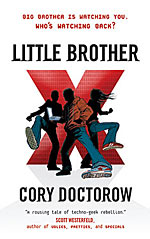
![]() Rhondak101
Rhondak101
4/14/2014
![]()
Security vs. Privacy
The other day I had the TV on in the background while I was doing other things. Law and Order was on (isn't it always?). I heard one of the characters say something like When people are afraid for their safety they will easily give up their privacy. This sentence is the basis of Cory Doctorow's Little Brother, which takes place in a very near-future Bay Area; the technology of surveillance seems only slightly ahead of ours.
Marcus, the protagonist of Little Brother, is a high school senior and a bit of a hacker (the looser meaning of the word, not the stricter one). He and his friends have figured out how to crack the surveillance software on the school-issued computers. They have also figured out that if they put gravels in their shoes they can fool the gait-recognition cameras placed throughout the school as truancy deterrence. They use these skills to ditch school and play Harajuku Fun Madness, an ARG (Alternate Reality Game) which requires the players to find specific locations within a city and "research crazy old films and songs and teen culture from around the world."
Unfortunately, Marcus and three friends have skipped school and are playing Harajuku Fun Madness when terrorists attack San Francisco. Because they are in the wrong place at the wrong time, they are picked up by the Department of Homeland Security (DHS) as persons of interest. They are questioned and subjected to all kinds of indignities. Marcus and two of his friends are released, but no one will tell them what happened to their other friend Darryl.
After his release, Marcus lies about his whereabouts to his parents. Since the city had been placed under Marshall Law and there was no public transportation, they believe him when he says he was stuck in a temporary shelter. He then realizes that the DHS has sloppily bugged his computer. He also learns that everyone's debit and transport cards are being traced by DHS. Because of these massive invasions on his and every other citizen's privacy, Marcus decides to create the handle M1k3y and declares digital war on the Department of Homeland Security, calling them out for treating everyone as a criminal in the name of safety. When he starts creating computer work-arounds, he says: "My technology was working for me, serving me, protecting me. It wasn't spying on me. This is why I loved technology: if you used it right, it could give you power and privacy." Marcus creates a small army of teens who work to show the public that everyone's right to privacy had been eroded. Marcus's father is the foil throughout most of the novel, taking the stand that sometimes rights have to be traded for security.
Little Brother has a very strong voice in its first-person narrator, Marcus. I am not one of those people who complain that the young adults in young adult novels don't sound like young adults. (As someone who reads the writing of 18-21 year olds everyday, I find that good fortune.) Marcus is a nerdy computer prodigy, but he is also clever, funny, and irreverent. Doctorow provides several info dumps along the way, but I don't mind those either. The character of Marcus would like to explain things to the uninitiated and I enjoyed learning about cryptography, probability and IP addresses. Let's face it: Marcus is most likely influenced by Doctorow's vision of himself at 18.
The novel brings up important issues that everyone should be thinking about, and even though it is categorized as a YA book, it is no more YA than Ender's Game is. The writing is sophisticated and the issues thought provoking.